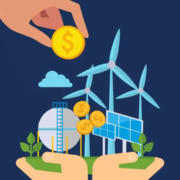Investing in Renewable Energy: A Sustainable Opportunity
Renewable energy is a key aspect of global sustainability efforts. This shift from fossil fuels not only aligns with environmental goals but also presents a promising opportunity for financial growth by providing individuals and financial institutions numerous investment opportunities in sustainable energy production. Investing in renewable energy is more than just a trend; it’s a strategic decision with substantial long-term financial and societal benefits.
Why Invest in Renewable Energy?
Renewable energy sources such as solar, wind, hydroelectric, and geothermal power are rapidly gaining traction as viable alternatives to traditional fossil fuels. The primary drivers behind this surge in interest include:
- Environmental Impact: Reducing carbon footprint and mitigating climate change are critical global imperatives. Investing in renewable energy supports these goals by promoting cleaner energy production methods.
- Government Support: Many governments worldwide are offering incentives, subsidies, and tax benefits to encourage investment in renewable energy projects. These incentives significantly enhance the financial viability of such investments.
- Cost Competitiveness: Advances in technology have made renewable energy sources increasingly cost-competitive with traditional fossil fuels. This shift, and the long-term benefits of such energy generation, makes renewable energy investments very financially attractive.
- Long-Term Stability: Unlike fossil fuels, which are finite resources subject to price volatility and geopolitical risks, renewable energy sources offer long-term stability and predictability in terms of operational costs.
Types of Renewable Energy Investments
Investors have a diverse range of options when it comes to investing in renewable energy:
- Solar Power: Includes financing solar panel installations on residential, commercial, or utility-scale projects as well as investing in solar panel manufacturing facilities.
- Wind Power: The manufacture, installation, and maintenance of windmills, both on land and off-shore, remain a lucrative investment opportunity.
- Hydropower: Although few major new hydroelectric are currently planned, the upgrade and maintenance of facilities that harness energy from flowing water meets sustainability investment criteria.
- Geothermal Energy: The increasing interest in extracting heat from beneath the Earth’s surface to generate electricity along with reduced production costs have accelerated investments in this sector.
Financial Considerations
As with any financial investment, the evaluation of renewable energy opportunities requires the consideration of several factors including,
- Return on Investment (ROI): Assessing the potential returns from renewable energy projects involves evaluating factors such as energy output efficiency, project life-cycle, operational costs (current and future), and revenue streams such as utility power purchase agreements.
- Risk Management: Understanding the risks associated with renewable energy investments, including technological, regulatory, and market risks, is critical..
- Diversification: Incorporating several different renewable energy investments into an otherwise diversified portfolio can help mitigate overall investment risk while potentially enhancing returns.
The Future of Renewable Energy Investing
It is clear that the renewable energy sector is poised for continued growth and innovation. Technological advancements, coupled with increasing global demand for sustainable energy solutions, create a fertile ground for investment opportunities. As governments and industries alike commit to reducing greenhouse gas emissions and transitioning towards cleaner energy sources, the renewable energy sector is expected to play a pivotal role in shaping the future energy landscape.
Start Investing Today for a Brighter Tomorrow
Now is the time to consider renewable energy investing as a cornerstone of a forward-thinking investment strategy. Investing in renewable energy offers not only the potential for significant financial returns but also the opportunity to support environmental sustainability. Whether through direct investments in renewable energy projects or through funds and stocks focused on “green” energy, investors can align their financial goals with their environmental and societal values. As the world moves towards a greener future, renewable energy investments stand out as a compelling option for those seeking both profitability and sustainability in their investment portfolios. Embracing this transition today can pave the way for a brighter and more sustainable tomorrow.
For more information on renewable energy investing, climate change, global warming, sustainability, and the environment, stay tuned to our blog for updates and insights.
And help us build a more sustainable and prosperous world through responsible investment practices by becoming a member of the Advance ESG community. It’s free to join and there are no future financial obligations. Together, we can make a difference in safeguarding our planet for future generations.
Green Quarter ESG – IMPACT ACTIONS
- Start Small with Solar
If you’re new to renewable energy, consider starting with a small solar installation for your home or business. Research local providers and see if your energy needs can be partially met through solar panels. Even small steps reduce your carbon footprint and pave the way for larger investments. - Switch to a Green Energy Provider
Many utility companies now offer “green energy” plans, where your electricity is sourced from renewable sources like wind or solar. Contact your utility provider to see if they have a green energy plan and switch today. - Research Tax Incentives and Rebates
Governments and municipalities often offer tax credits, grants, or rebates for renewable energy installations. Look up the incentives available in your area to understand potential cost savings and factor them into your investment decisions. - Create a Renewable Energy Goal for Your Business
Set an achievable renewable energy target for the next year, like sourcing 10–20% of your energy needs from renewables. Having a clear goal helps with planning and evaluating different options for renewable investments. - Invest in Renewable Energy Funds
If direct investment in renewable infrastructure isn’t feasible, explore mutual funds or ETFs (Exchange-Traded Funds) focused on renewable energy. Investing in these funds can align your portfolio with sustainability goals with relative ease. - Consider Power Purchase Agreements (PPAs)
For businesses, look into Power Purchase Agreements, where you commit to buying power from a renewable energy provider at a set price. This arrangement can offer cost stability and support renewable growth without requiring an upfront investment. - Reduce Your Business’s Carbon Footprint with Offsets
Until you can fully transition to renewables, consider purchasing carbon offsets to balance your energy use. Choose reputable providers who support projects like wind farms, solar installations, or reforestation. - Partner with Local Renewable Energy Startups
Engage with emerging renewable energy startups in your community or industry. By supporting or collaborating with these companies, you can help drive local sustainability efforts and gain access to innovative energy solutions. - Implement Energy Efficiency Measures
Reducing energy waste is an immediate way to lower costs and environmental impact. Start with small changes, like switching to LED lighting, upgrading HVAC systems, or conducting an energy audit to find and reduce inefficiencies. - Educate Your Team on Renewable Benefits
Share the benefits of renewable energy with your team or stakeholders. Host a quick info session or lunch-and-learn about the financial and environmental impacts of renewables. This can inspire buy-in and support for future sustainability initiatives.

